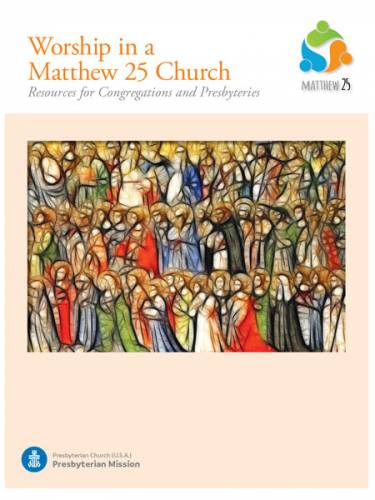Online resource ‘Worship in a Matthew 25 Church’ also includes morning, evening prayers
by Mike Ferguson | Presbyterian News Service

LOUISVILLE — A free new booklet is proof Presbyterians can confess their sins, affirm their faith, pray, break bread and be dismissed — and start and end their day with prayer, all without leaving the 25th chapter of the Gospel of Matthew.
“Worship in a Matthew 25 Church: Resources for Congregations and Presbyteries” is now available here. It’s a recent addition to the Matthew 25 Welcome Kit.
The Matthew 25 invitation, which has been accepted to date by about 240 churches and nearly 25 mid councils, recognizes Christ’s urgent call to be a church of action. Congregations and mid councils accepting the invitation agree to engage in one or more of three focus areas: building congregational vitality, dismantling structural racism and eradicating systemic poverty.
The Rev. Dr. David Gambrell, associate for worship in the Presbyterian Mission Agency’s Office of Theology and Worship and the developer of “Worship in a Matthew 25 Church,” called the three areas of the Matthew 25 focus “urgent priorities for the mission of the church in our time.”
“If we want to join this mission,” he said in an email, “we need to be shaped and equipped to live as we believe and pray — the kind of formation that happens in worship.”
After some opening sentences taken from the Beatitudes, “Worship in a Matthew 25 Church” then transitions to confession and pardon and an affirmation of faith, both naming all of the Matthew 25 focus areas. For the affirmation of faith, Gambrell draws from “A Brief Statement of Faith.”

The Rev. Dr. David Gambrell, associate for worship with the Office of Theology and Worship, preached during Triennium in July on “Prone to Wander.” (Photo by Rich Copley)
“I went into this project with the conviction that the focuses on vitality, racism and poverty spring from the heart of the gospel,” he said. “But I was delighted to find these themes already embedded in well-known texts such as ‘A Brief Statement of Faith’ — hidden in plain sight since the reunion that formed this denomination.”
The work “also gave me a good excuse to dig deep in the Gospel of Matthew, featured in the upcoming Year A of the Revised Common Lectionary,” Gambrell said.
“Worship in a Matthew 25 Church” includes additional texts to be used periodically in liturgy — thanksgiving for baptism, invitation to discipleship, a litany of lament (which includes Jesus’ seven woes found in Matthew 23, the condemnations of Matthew 25 and Good Friday liturgy), a litany of commitment and a responsive reading of the Beatitudes, ordered under the three focus areas.
“I see it as an important part of my work to connect the dots between ancient Christian practices and contemporary concerns,” Gambrell said. “Accordingly, I drew on some old patterns for developing these new prayers, including the baptismal renunciations and affirmations for the litany of commitment, and the solemn reproaches of the cross for the litany of lament.”
He said he’s “especially excited” about the resources for morning and evening prayer, the last entry in the resource before two final pages for note-taking.
“They include a simple suggestion for reading the Gospel of Matthew in a month,” he said. “They provide a way to frame each day with the Matthew 25 vision — beginning the day with a prayer to recognize Christ in the faces of our neighbors and ending the day with thanksgiving, intercession, confession and lament: ‘When did I recognize you?’”
“They also,” he said, “offer a very basic entry into the ancient pattern of daily prayer.”
Watch for the online publication of a Matthew 25 Bible study, coming soon.
![]() You may freely reuse and distribute this article in its entirety for non-commercial purposes in any medium. Please include author attribution, photography credits, and a link to the original article. This work is licensed under a Creative Commons Attribution-NonCommercial-NoDeratives 4.0 International License.
You may freely reuse and distribute this article in its entirety for non-commercial purposes in any medium. Please include author attribution, photography credits, and a link to the original article. This work is licensed under a Creative Commons Attribution-NonCommercial-NoDeratives 4.0 International License.
Categories: Faith & Worship, Matthew 25
Tags: a brief statement of faith, beatitudes, bible study, matthew 23, matthew 25, matthew 25 invitation, office of theology and worship, rev. dr. david gambrell, revised common lectionary, worship in a matthew 25 church
Ministries: Matthew 25 in the PC(USA): Join the Movement, Theology and Worship, Theology, Formation & Evangelism, Worship